I know* how Game of Thrones will end
*I read the first book. And Tolkien. So I know what I'm talking about.
When I read A Game of Thrones about a decade ago, I had three main reactions:
I did not like that relationship.
I was blindsided by how the book just ended with what felt like zero resolution even in the short term.
I thought I knew how the whole series would end.
George R.R. Martin is still working on that last part. For myself, I never read the second book. I never watched the HBO series. If he ever finishes the series, I may try the books again.
But I still think I know the ending. He hid the ending in the opening pages—and the reason for the ending has to do with being nothing like Tolkien.
I foresee the end
The central idea of Game of Thrones is that all these individuals from across the land are fighting and scheming and killing and dying to win the “game of thrones.” To sit on the Iron Throne. To rule.
So many stories. So much heartache. So much cruelty.
So much blood.
But winter is coming. The White Walkers are coming.
At the very beginning of the series, we meet the White Walkers. Nothing much happens with them in the first book, but they’re there.
The last book will be a book of last stands against them. Doesn’t matter if the White Walkers have been “dealt with” before then; they’ll be back. The White Walkers will come for all of Westeros in overwhelming numbers. Winter is coming. It cannot be stopped.
Some characters (and I have no idea who is still alive at this point) will form unlikely alliances against this ultimate threat. Others will relish the chaos and attempt to scheme and slaughter their way to the Iron Throne anyway. Desperation and denial will consume their hearts. Some will hold out flickering flames of hope.
Doesn’t matter.
At the end—the very end—the last character will sit on that Iron Throne ruling a land of ice and corpses. This character will have won that throne through bloody, wicked, and perhaps cowardly means.
Then the White Walkers will come. That last character’s guards will battle them. Swords clanging, men screaming, doors breaking.
Frost seeping through the stone itself.
At last, the White Walkers will enter the throne room, overwhelm the remaining guards, and slaughter the final character. His or her death will be without fanfare—cold and meaningless and full of bitterness.
When it comes to the game of thrones, no one wins.
The opposite of Tolkien’s Eucatastrophe
Martin has been telling us this all along.
His famous modus operandi is to kill off characters. Beloved characters. Hated characters. It doesn’t matter.
My theory is just that if he ever does end the series, he will do this to the extreme and bring the entire series full circle.
Yes, there will be politics and gods and all that, but the end will be the White Walkers slaughtering everyone.
This also fits thematically with Martin’s overall approach. It’s hard to imagine Martin writing a Tolkien-style Eucatastrophe—the “good catastrophe” where at the darkest moment joy triumphs. Tolkien characterized such endings as the opposite of tragedies yet not free of the tragic touch. He wrote:
It does not deny the existence of dyscatastrophe, of sorrow and failure: the possibility of these is necessary to the joy of deliverance; it denies (in the face of much evidence, if you will) universal final defeat and in so far is evangelium, giving a fleeting glimpse of Joy, Joy beyond the walls of the world, poignant as grief.1
We can see this when Frodo hesitates on the edge of Mount Doom, unable to destroy the ring he has borne through such danger and sorrow. Yet Gollum—twisted and pitiful—wrenches it from Frodo and becomes the unhappy means by which the ring plummets into the fires of the mountain, freeing Middle-Earth from the shadow of Sauron when all seems lost.
Tolkien gave us a good catastrophe—one that had been brewing across The Hobbit and The Lord of the Rings.
Martin will not do that. If Tolkien embraced the opposite of tragedy in Eucatastrophe, Martin will embrace the opposite of Eucatastrophe.
He will embrace total and utter catastrophe.
Winter is coming. No one will survive.
No one will win the game of thrones.2
If you’d like to read my own take on dark(ish) fantasy, my series about a cursed minotaur starts with Red Wool. Think a little bit Sherlock Holmes, a little bit The Witcher, and a little bit Beauty and the Beast—but in a way you’ve never quite seen before.
One reviewer said:
I’m not usually into the real dark stuff, but this gave me all the vibes without all the discomfort—well, just a little discomfort. . . . It’s short but the world feels so real and detailed, and I’m already cheering for the main character. Enjoyed and looking forward to more!
J.R.R. Tolkien, “On Fairy Stories,” pg. 33.
Or he just won’t finish the books. Or he’ll do something different. Again, I’ve only read the first book, and that was years ago. This is nothing but a theory… a literary theory. And perhaps a wild one at that.



